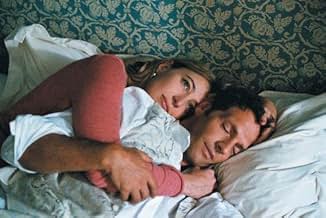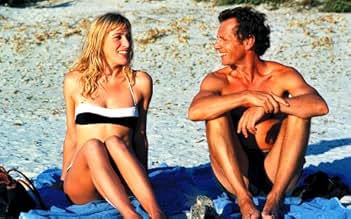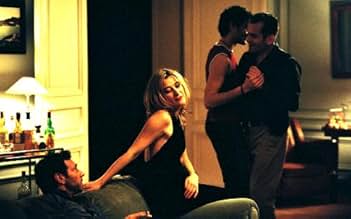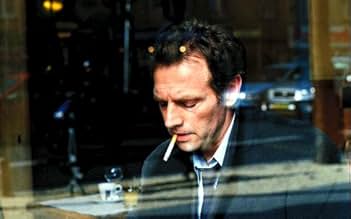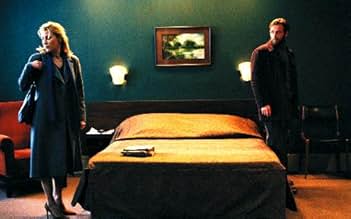AVALIAÇÃO DA IMDb
6,6/10
11 mil
SUA AVALIAÇÃO
Cinco etapas no romance entre uma mulher e um homem.Cinco etapas no romance entre uma mulher e um homem.Cinco etapas no romance entre uma mulher e um homem.
- Direção
- Roteiristas
- Artistas
- Prêmios
- 1 vitória e 2 indicações no total
Valeria Bruni Tedeschi
- Marion
- (as Valeria Bruni-Tedeschi)
Ninon Brétécher
- Sophie
- (as Ninon Bretecher)
- Direção
- Roteiristas
- Elenco e equipe completos
- Produção, bilheteria e muito mais no IMDbPro
Avaliações em destaque
"5x2" is not the first film to explore a relationship by going backwards from its end to its beginning (Pinter's "Betrayal" comes to mind let alone the mystery in "Memento").
But writer/director François Ozon, aided by superb acting, uses the structure for a thoughtful and intriguing commentary on love and marriage.
The first scene sets up our curiosity as while a lawyer dryly reads the divorce agreement, letting us know the cold facts of the marriage, there is palpable electricity between the about to be ex-wife and husband such that we are not surprised when they immediately head to a hotel, as it turns out their relationship started in a hotel.
We are introduced to the complexities between this couple as their layers are played out through a sexual encounter that is open to "he said, she said" interpretations that will continue as we flashback to key points in their relationship. The other four incidents show them as parents, at the birth of their child, at their wedding and at their meeting, all played out in relation to her parents' long-time conflicted marriage and his brother's homosexual arrangements, amid other encounters.
Valeria Bruni Tedeschi is so luminous as "Marion" that I'm not sure if it's her beautiful acting, as she is in turn up-tight, conflicted, sensual, fragile or aggressive, or her character who changes or that François Ozon is such a sensitive director of women, as he showed in "Swimming Pool" and "Under the Sand (Sous le sable)", that I favored her character, even if we gradually learn that she may or may not be as much of a victim as it seems and she is as much influenced by physical imperatives as he is. Stéphane Freiss plays virtually the opposite of his caring husband in "Le Grand Rôle," even if it becomes less and less clear he's the S.O.B. he at first could appear to be, or if his character experiences any changes or learns anything through serial somewhat monogamy, especially because some details in their past are just left mysterious.
The film is certainly not optimistic about love being an effective basis for a man and a woman to sustain a long term relationship and it leaves open-ended for a gendered discussion about whether that applies to the particulars of these individuals, or to them as French or as Europeans, vs. universals, as Americans would probably interpret their interactions differently than other audiences.
Certainly, in a frankly sexually mature film it's nice to see non-Hollywood bodies, of a zaftig woman and a guy without a personal trainer credit listed.
The frequent use of Paolo Conte songs on the soundtrack add to the ironic feeling surrounding the film, even if the lyrics aren't translated in the many white-on-white subtitles.
Going off into the sunset, and the cinematography and production design, from dark to light, throughout are lovely, hasn't had such an ironic conclusion since the original "Planet of the Apes."
But writer/director François Ozon, aided by superb acting, uses the structure for a thoughtful and intriguing commentary on love and marriage.
The first scene sets up our curiosity as while a lawyer dryly reads the divorce agreement, letting us know the cold facts of the marriage, there is palpable electricity between the about to be ex-wife and husband such that we are not surprised when they immediately head to a hotel, as it turns out their relationship started in a hotel.
We are introduced to the complexities between this couple as their layers are played out through a sexual encounter that is open to "he said, she said" interpretations that will continue as we flashback to key points in their relationship. The other four incidents show them as parents, at the birth of their child, at their wedding and at their meeting, all played out in relation to her parents' long-time conflicted marriage and his brother's homosexual arrangements, amid other encounters.
Valeria Bruni Tedeschi is so luminous as "Marion" that I'm not sure if it's her beautiful acting, as she is in turn up-tight, conflicted, sensual, fragile or aggressive, or her character who changes or that François Ozon is such a sensitive director of women, as he showed in "Swimming Pool" and "Under the Sand (Sous le sable)", that I favored her character, even if we gradually learn that she may or may not be as much of a victim as it seems and she is as much influenced by physical imperatives as he is. Stéphane Freiss plays virtually the opposite of his caring husband in "Le Grand Rôle," even if it becomes less and less clear he's the S.O.B. he at first could appear to be, or if his character experiences any changes or learns anything through serial somewhat monogamy, especially because some details in their past are just left mysterious.
The film is certainly not optimistic about love being an effective basis for a man and a woman to sustain a long term relationship and it leaves open-ended for a gendered discussion about whether that applies to the particulars of these individuals, or to them as French or as Europeans, vs. universals, as Americans would probably interpret their interactions differently than other audiences.
Certainly, in a frankly sexually mature film it's nice to see non-Hollywood bodies, of a zaftig woman and a guy without a personal trainer credit listed.
The frequent use of Paolo Conte songs on the soundtrack add to the ironic feeling surrounding the film, even if the lyrics aren't translated in the many white-on-white subtitles.
Going off into the sunset, and the cinematography and production design, from dark to light, throughout are lovely, hasn't had such an ironic conclusion since the original "Planet of the Apes."
The 'reverse chronology' format, that has now been tried and tested a few times, will perhaps one day become as unshockingly acceptable as the more prosaic use of 'flashbacks'. Both involve non-linear storytelling, and both attempt to grab audience attention by time distortions. Flashbacks are now so commonplace within mainstream films that the 'purist' Dogme movement banned them altogether being so structurally clichéd and rarely justified. So when Ozon's 5 x 2 tells a love story about two people in five chapters, but starting with the last chapter and working forward, is he using a valid artistic device or just being gimmicky? In the opening scene, our loving couple (Marion and Gilles) are finalising the details of their divorce. Afterwards they have a last-fling sexual bout which takes an unpleasant turn. Flipping back scene by scene, we next see them as a loving married and entertaining visitors, chatting away about fidelity and sexual deviance and again we see a slightly unpleasant turn perhaps the seeds of the divorce that we already know will happen. In each chapter we follow the love story to earlier and earlier stages.
In Irreversible, another French film, the reverse chronology format was used to shock, to take us on a journey from hell to heaven. In Memento it was used to heighten suspense and provide the basic device that the mystery revolved upon we never knew more than the main character about what had happened before.
In 5 x 2 the effect is to highlight small things that go wrong in a fairly ordinary relationship. If it were a gradual decline from better to worse they might have gone unnoticed, but our starting point being divorce our interest in why things went wrong is perhaps more acute.
The other thing that marks out this slightly unusual film is the remarkable acting range shown by Valeria Bruni Tedeschi (who won Best Actress at the Venice Film Festival for her portrayal of Marion). We see not only an incredible range of emotion but many sides to her character. The finely nuanced performance draws attention to things like the person a woman may be to her husband whilst still have a secret side, or her ability to put on a brave face when crying inside. The observation of a range of emotional and sexual explorations is done with the attention to detail that seems so intrinsic to much French cinema: the characters really seem to feel what is happening as if there is no camera on them at all. Sadly 5 x 2 however may not have the shock value of film like Irreversible or the sugar-candy feelgood factor of films like Amelie: mainstream foreign audiences like their French movies to nevertheless fulfil certain passive entertainment criteria, which this thinking and understated movie obstinately refuses to do.
In Irreversible, another French film, the reverse chronology format was used to shock, to take us on a journey from hell to heaven. In Memento it was used to heighten suspense and provide the basic device that the mystery revolved upon we never knew more than the main character about what had happened before.
In 5 x 2 the effect is to highlight small things that go wrong in a fairly ordinary relationship. If it were a gradual decline from better to worse they might have gone unnoticed, but our starting point being divorce our interest in why things went wrong is perhaps more acute.
The other thing that marks out this slightly unusual film is the remarkable acting range shown by Valeria Bruni Tedeschi (who won Best Actress at the Venice Film Festival for her portrayal of Marion). We see not only an incredible range of emotion but many sides to her character. The finely nuanced performance draws attention to things like the person a woman may be to her husband whilst still have a secret side, or her ability to put on a brave face when crying inside. The observation of a range of emotional and sexual explorations is done with the attention to detail that seems so intrinsic to much French cinema: the characters really seem to feel what is happening as if there is no camera on them at all. Sadly 5 x 2 however may not have the shock value of film like Irreversible or the sugar-candy feelgood factor of films like Amelie: mainstream foreign audiences like their French movies to nevertheless fulfil certain passive entertainment criteria, which this thinking and understated movie obstinately refuses to do.
10meitschi
As another reviewer before me, I also can't believe how badly people are writing about this film here. I adore Francois Ozon and I've seen all his feature-length films. This one seems quite different from the others (except, maybe, Sous le sable) and it's as low-key as Ozon could ever get, but it is still an excellently scripted and played film that makes one think.
I didn't consider the backwards structure to be gimmicky at all, it rather helped the viewer to better make out flaws early in the relationship. There is betrayal in each one of the episodes, starting with the last (chronologically the first) one. The film shows us that even little egoisms and uncharitable behavior can lead to grave consequences - in this case, to divorce. The woman, Marion, seems to be easily led anywhere, not having enough standing of her own, while the man, Gilles, seems to be egoistic, cowardly and sometimes just simply sex-crazed.
I think the structure rather helps us to understand the characters better, since we have already seen the consequences of their actions and attitudes. I didn't consider the large gaps between (and also in) the episodes to be a problem - they only acknowledge that the whole story can never be told because it is made up by every single moment between their first meeting and the last time they see each other. These episodes can only indicate what went wrong, they cannot explain - that would be too simplistic.
The actors were excellent, especially Valeria Bruni-Tedeschi. The way the looks of the main characters changed during the film (becoming more and more youthful and fresh as the story goes backwards), was also excellently done.
The parallel love stories (between Gilles's brother and his young lover, and between Marion's parents) shed some more light on the relationship between Marion and Gilles - also on what might have gone wrong.
This film should probably be required viewing for every couple wanting to get married... :-) Not in order to deter them, but rather to make them aware of the pitfalls of relationships and married life.
I didn't consider the backwards structure to be gimmicky at all, it rather helped the viewer to better make out flaws early in the relationship. There is betrayal in each one of the episodes, starting with the last (chronologically the first) one. The film shows us that even little egoisms and uncharitable behavior can lead to grave consequences - in this case, to divorce. The woman, Marion, seems to be easily led anywhere, not having enough standing of her own, while the man, Gilles, seems to be egoistic, cowardly and sometimes just simply sex-crazed.
I think the structure rather helps us to understand the characters better, since we have already seen the consequences of their actions and attitudes. I didn't consider the large gaps between (and also in) the episodes to be a problem - they only acknowledge that the whole story can never be told because it is made up by every single moment between their first meeting and the last time they see each other. These episodes can only indicate what went wrong, they cannot explain - that would be too simplistic.
The actors were excellent, especially Valeria Bruni-Tedeschi. The way the looks of the main characters changed during the film (becoming more and more youthful and fresh as the story goes backwards), was also excellently done.
The parallel love stories (between Gilles's brother and his young lover, and between Marion's parents) shed some more light on the relationship between Marion and Gilles - also on what might have gone wrong.
This film should probably be required viewing for every couple wanting to get married... :-) Not in order to deter them, but rather to make them aware of the pitfalls of relationships and married life.
The reverse chronology brings together what all too often tears us apart, wait it's love, love that tears us apart. Marriage really is a different thing altogether.
The film feels to a degree like flipping through old photographs, nostalgia is a form of pain, right? What was interesting was to see the actors really portraying quite different characters in the five sets, although had I seen the French Remix where the scenes are re-reversed, perhaps it would have all seemed more fated and just an unwrapping of a bitter, broken wedding gift.
I did wonder if the movie was filmed in proper chronological order.
There is something about maid Marion's parents, that is placed on a very tiny pedestal, without much explanation. I found compassion in watching Valerie Bruni-Tedeschi here...while her lesser half did not get much of a fair chance at redemption.
All of us, and all of our partners are flawed. But perhaps not all relationships are fatally flawed. Find someone emotionally compatible and give it a shot, maybe savor the best memories periodically. Good luck...
The film feels to a degree like flipping through old photographs, nostalgia is a form of pain, right? What was interesting was to see the actors really portraying quite different characters in the five sets, although had I seen the French Remix where the scenes are re-reversed, perhaps it would have all seemed more fated and just an unwrapping of a bitter, broken wedding gift.
I did wonder if the movie was filmed in proper chronological order.
There is something about maid Marion's parents, that is placed on a very tiny pedestal, without much explanation. I found compassion in watching Valerie Bruni-Tedeschi here...while her lesser half did not get much of a fair chance at redemption.
All of us, and all of our partners are flawed. But perhaps not all relationships are fatally flawed. Find someone emotionally compatible and give it a shot, maybe savor the best memories periodically. Good luck...
The end and beginning of the love of the French couple Marion (Valeria Bruni-Tedeschi) and Gilles (Stéphane Freiss) is disclosed backwards through five moments in their lives:
1st moment: They divorce and have one last brutal intercourse without love.
2nd moment: With their relationship shaken, they have a dinner party with Gilles's gay brother Christophe (Antoine Chappey) and his younger mate, when an infidelity is disclosed at the dinner table.
3rd moment: The troubled pregnancy of Marion and the delivery of their premature son Nicolas, with the total absence of Giles.
4th moment: Their wedding, when Marion commits adultery with an unknown guest of the hotel.
5th moment: .When they meet each other in an Italian resort and begin their relationship.
This simple and realistic movie recalls "Irreversible" (2002), since the screenplay discloses five moments of the relationship of a couple chronologically backwards. I believe the first intention of François Ozon is to remember that behind every divorce, there is a couple that loved each other in the past, that decided to marry each other expecting to live together and raise a family of their own. However, relationships usually deteriorate and time destroys everything including love. In these fragmented glimpses of the lives of Marion and Gilles, the viewer does not see exactly when their love ended, but after their initial encounter, there are many signs suggesting the beginning of the end: the adultery of Marion in the wedding night; the absence of Gilles in the birth of his son; his consented participation in an orgy in the presence of Marion, visibly showing one sort of last attempt to save their empty marriage. Further to the good screenplay, the outstanding and strong performances of the sexy Valeria Bruni-Tedeschi and Stéphane Freiss give the credibility to the characters. My vote is seven.
Title (Brazil): "Amor em 5 Tempos" ("Love in 5 Times")
1st moment: They divorce and have one last brutal intercourse without love.
2nd moment: With their relationship shaken, they have a dinner party with Gilles's gay brother Christophe (Antoine Chappey) and his younger mate, when an infidelity is disclosed at the dinner table.
3rd moment: The troubled pregnancy of Marion and the delivery of their premature son Nicolas, with the total absence of Giles.
4th moment: Their wedding, when Marion commits adultery with an unknown guest of the hotel.
5th moment: .When they meet each other in an Italian resort and begin their relationship.
This simple and realistic movie recalls "Irreversible" (2002), since the screenplay discloses five moments of the relationship of a couple chronologically backwards. I believe the first intention of François Ozon is to remember that behind every divorce, there is a couple that loved each other in the past, that decided to marry each other expecting to live together and raise a family of their own. However, relationships usually deteriorate and time destroys everything including love. In these fragmented glimpses of the lives of Marion and Gilles, the viewer does not see exactly when their love ended, but after their initial encounter, there are many signs suggesting the beginning of the end: the adultery of Marion in the wedding night; the absence of Gilles in the birth of his son; his consented participation in an orgy in the presence of Marion, visibly showing one sort of last attempt to save their empty marriage. Further to the good screenplay, the outstanding and strong performances of the sexy Valeria Bruni-Tedeschi and Stéphane Freiss give the credibility to the characters. My vote is seven.
Title (Brazil): "Amor em 5 Tempos" ("Love in 5 Times")
Você sabia?
- CuriosidadesIn the French edition of the DVD, the director offers a version of the movie titled "2 x 5". This version shows the five sequences in the chronological order, from the moment the couple meets till their divorce. Subtle editing work has been applied to make the movie work.
- Erros de gravaçãoThe scene where the American came to Marion during the wedding night and introduced himself who arrived in France today and would leave tomorrow for LA. Who would just do that? It's just lame.
(Answer: someone not coming from the USA, for instance.)
Principais escolhas
Faça login para avaliar e ver a lista de recomendações personalizadas
- How long is Five Times Two?Fornecido pela Alexa
Detalhes
- Data de lançamento
- País de origem
- Centrais de atendimento oficiais
- Idiomas
- Também conhecido como
- Five Times Two
- Locações de filme
- Empresas de produção
- Consulte mais créditos da empresa na IMDbPro
Bilheteria
- Orçamento
- € 5.250.784 (estimativa)
- Faturamento bruto nos EUA e Canadá
- US$ 128.752
- Fim de semana de estreia nos EUA e Canadá
- US$ 15.667
- 12 de jun. de 2005
- Faturamento bruto mundial
- US$ 7.444.906
- Tempo de duração
- 1 h 30 min(90 min)
- Mixagem de som
- Proporção
- 1.85 : 1
Contribua para esta página
Sugerir uma alteração ou adicionar conteúdo ausente


